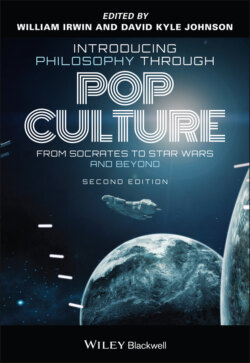Читать книгу Introducing Philosophy Through Pop Culture - Группа авторов - Страница 34
Wikiality (Cultural Relativism)
ОглавлениеI love Wikipedia. Any site that's got a longer entry on Truthiness than on Lutherans has its priorities straight … any user can change any entry, and if enough other users agree with him it becomes true … If only the entire body of human knowledge worked this way. And it can, thanks to tonight's word: wikiality … We should apply these principles to all information. All we need to do is convince a majority of people that some factoid is true … what we're doing is bringing democracy to knowledge.
– Stephen Colbert
The Colbert Report, July 31, 2006
Wikipedia no longer operates like it did in 2006. Not everyone can edit it, those who do are vetted, and additions and changes are carefully sourced and fact‐checked. As online encyclopedias go, it’s fairly reliable and useful–especially as a starting point for research. But in 2006, not so much; that’s why Colbert coined the term to describe the “reality” created by majority consensus. Report‐Colbert told us that if someone writes something on Wikipedia and enough people believe it, it “becomes true.” With Wikiality, Colbert espoused a naive “cultural relativism.” The cultural relativist, like the individual relativist, says that truth is relative. However, the cultural relativist says truth is relative to whole cultures, rather than to individuals. In the moral realm, the cultural relativist says that the majority consensus on morality in a culture defines morality for that culture. For example, if the majority of the people in a culture agree that abortion is moral, then abortion is moral for the members of that culture.
Cultural relativism is tempting because it appears to resolve cultural conflicts. In America, most people marry for love. However, for most of human history, marriage was socially motivated and arranged by family. Until recently, for example, nearly all Hindu marriages were arranged by the parents of the couple. As Colbert himself said, “They [don't] fall in love, they [learn] to love. It's a wonderful system.”16 Unlike Colbert, most Americans would think it morally wrong for Indian parents to determine their child's marriage partner. But the cultural moral relativist would say that it is “true for them” that arranged marriage is morally right since it is the custom of the majority in their culture. And this seems to have some intuitive appeal, because there does not seem to be a universal “right answer” to the question, “What is the correct motivation for marriage?”17 It also would seem to promote tolerance between cultures.
Indeed, it seems that the morality of some things is relative to culture. For example, in many places in Europe, men and women share the same public toilet facilities. And (transgender issues aside) it would be morally wrong of a European, who was used to this practice, to use the opposites sex's bathroom in America (as long as s/he was aware of the American custom.) But it cannot be that the answers to all moral questions are relative to culture. Consider female circumcision – where the clitoris of a nine‐year‐old girl is cut off without anesthetic and her vagina is sewn shut. Since this practice is culturally accepted in many parts of Africa, cultural relativism would say it's morally acceptable in those parts of Africa. But clearly most people will disagree and appeal to moral facts that transcend culture to insist that female circumcision is always wrong, regardless of what culture it occurs in.
Contrary to its aims, cultural moral relativism can actually promote intolerance between cultures. For example, during the Third Reich in Germany, the oppression of Jews was accepted as moral by the majority. Thus, according to cultural moral relativism, the intolerance of the Nazi party was morally justified. Of course, you probably do not agree … despite what Colbert's “child‐safe Nazi” video might have made some think,18 and the fact that Valkyrie taught us that there were “some good Nazis.”19 Thus, cultural moral relativism is hard to swallow.20
The follies of cultural moral relativism do not stop there, however. Consider the United States when it was founded. Slavery was a culturally accepted practice. According to cultural relativists, that means that (at that time), in the United States, slavery was not morally wrong. And they are not just saying that it was not seen as morally wrong; that's obvious, since the majority accepted it. More dramatically, the cultural relativist would say that slavery actually was morally acceptable. Not only is this contrary to intuition – slavery was wrong even before we figured out it was wrong – but it means that the abolition of slavery was not a real step forward in moral progress for the nation. To progress morally, one must stop doing something wrong and start doing something right. According to the cultural moral relativist, however, when America abolished slavery it went from doing something right (majority approved slavery) to something else right (majority approved abolition). It did not progress morally; it just changed its definition of what was moral. Obviously most will think this absurd because obviously most think slavery was wrong and that we obviously made moral progress as a nation by abolishing it. If we had not, Colbert would not have sung Honest Abe – our greatest non‐Reagan president – “Happy Birthday” on his 200th.21
So, the principle of charity demands we conclude that Colbert is not a cultural relativist. He does not really think that the entire body of human knowledge works like Wikipedia used to. He does not really think that “[t]ogether we can create a reality that we can all agree on – the reality we just agreed on.”22 Wikialty is just one of his “WØRDs.”23
